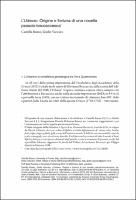Chapter L’Urbano. Origine e fortuna di una novella pseudo-boccaccesca
| dc.contributor.author | Russo, Camilla | |
| dc.contributor.author | Vaccaro, Giulio | |
| dc.date.accessioned | 2022-09-15T20:07:30Z | |
| dc.date.available | 2022-09-15T20:07:30Z | |
| dc.date.issued | 2020 | |
| dc.identifier | ONIX_20220915_9788855182362_94 | |
| dc.identifier.issn | 2704-5919 | |
| dc.identifier.uri | https://library.oapen.org/handle/20.500.12657/58298 | |
| dc.language | Italian | |
| dc.relation.ispartofseries | Studi e saggi | |
| dc.subject.classification | thema EDItEUR::D Biography, Literature and Literary studies | en_US |
| dc.subject.other | pseudo-Boccaccio | |
| dc.subject.other | genealogical tales | |
| dc.subject.other | miscellaneous manuscripts. | |
| dc.title | Chapter L’Urbano. Origine e fortuna di una novella pseudo-boccaccesca | |
| dc.type | chapter | |
| oapen.abstract.otherlanguage | The paper pursues an investigation on an apocryphal text still underinvestigated by scholars: the Urbano, falsely attributed to Boccaccio. The first part focuses on its fortune in the Boccaccio’s canon, from the first edition of the Vocabolario della Crusca to the Boccaccio’s complete works edited in the Ottocento; furthermore, are pointed out its connections with the Libellus de Constantino Magno eiusque matre Helena, the main source of the plot, and with other genealogical medieval tales, such as the Libro imperiale and the Manfredo. The second part focuses on the manuscript tradition of the text, in order to demonstrate as its circulation in Quattrocento’s miscellaneous manuscripts of rhetorical texts in the vernacular, containing several texts by Boccaccio, has probably influenced the spurious attribution. | |
| oapen.identifier.doi | 10.36253/978-88-5518-236-2.11 | |
| oapen.relation.isPublishedBy | bf65d21a-78e5-4ba2-983a-dbfa90962870 | |
| oapen.relation.isbn | 9788855182362 | |
| oapen.series.number | 219 | |
| oapen.pages | 25 | |
| oapen.place.publication | Florence |

